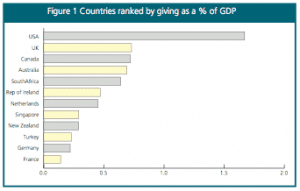Americans give over 1.5% of GDP to charitable organizations, according to International Comparisons of Charitable Giving by the ‘Charities Aid Foundation’ in England. Such generosity is almost double the next nation’s rate of giving: England with .73%. Such willingness to give to those less fortunate is a wonderful quality about America, and surely stems in part from the fact that ours is a nation that was built by peoples moving into new territories with unproven technologies and with religious motives to help neighbors in the grand experiment. Moreover, the incredible wealth generated by the US (the present economic crises notwithstanding) has given opportunity for many to give back – the incredible sums given by Bill Gates and Warren Buffet in recent months being only the most talked about. England’s coalition government, on the other hand, is trying to spur charitable donations from among the country’s richest to help offset the drastic cuts required in the government’s budget over the next few years.
Though Americans’ willingness to give, even during hard times, is one of the ways we have been able to keep working toward a ‘more perfect union,’ experts are warning that charitable donations will get knocked down severely as the Great Recession continues, and as the full economic and environmental costs of the BP/Haliburton/TransOcean disaster in the Gulf of Mexico are realized.

The US, at the moment, gives twice as much as others
There’s no doubt that charitable giving slowed in 2008 and slowed still further in 2009 as the Great Recession took hold. But many experts noted that the figures could easily have been worse.
Unfortunately, events like the ongoing oil leak in the Gulf are likely to make 2010’s donations shrink still further. According to a posting by Holly Hall at The Chronicle of Philanthropy:
The BP oil spill will depress charitable contributions by $200-million to $300-million this year, and by as much as $600-million in 2011, largely because of its devastating effects on the Gulf Coast economy, according to a new index. The new index, which is called Philanthrodex, tracks and predicts charitable giving from all sources nationwide. It provides monthly, quarterly, and annual snapshots—and forecasts for the year ahead based on a statistical model.
The index is brand new, so Ms. Hall suggests we take the prognostication with a grain of salt. Nevertheless, the devastation of the Gulf communities will surely both require charitable aid and divert resources from economic growth that might allow such aid. Unlike many of the health and social-equality issues that drive US charitable giving, the BP/Haliburton/Transocean disaster was a foreseeable one and one whose impact could have been mitigated with better oversight and even some fundamental good sense. We hope that Americans continue to support each other with charitable donations and community action, and perhaps we can find ways to ensure that corporations might occasionally behave in responsible ways that also help reaffirm our ambitions for ‘a more perfect union.’
